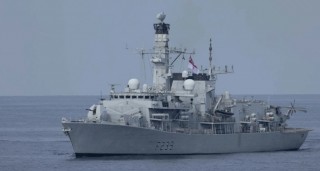Loading
Search
▼ UK Warship Carries Out North Korean Sanctions Monitoring Mission Near Japan
- Category:Other
Royal Navy says HMS Richmond frigate tracked DPRK ship-to-ship transfers of contraband in September
The U.K. recently deployed a warship to the waters around Japan to monitor North Korea’s illicit maritime activities to circumvent U.N. sanctions, the British navy announced on Monday.
The HMS Richmond carried out sanctions surveillance operations including tracking DPRK ship-to-ship transfers of contraband from early to mid-September, the Royal Navy said in a press release.
The British surveillance operation came as part of an ongoing Indo-Pacific tour by the U.K. Carrier Strike Group, which is led by the aircraft carrier HMS Prince of Wales.
The Type 23 frigate paid a visit to Busan in South Korea last month before embarking on patrols around Japan, which also supported Japan’s information gathering activities on vessels suspected of violating U.N. sanctions, the Royal Navy said.
“It is all part of work to uphold several U.N. sanctions targeting the Pyongyang regime and the unlawful generation of revenue, aimed at the dismantling of its weapons of mass destruction and ballistic missile programmes,” the press release said.
The frigate’s recent mission marked the 14th time since 2018 that a British vessel has participated in U.N. sanctions monitoring activities, with the patrol ships HMS Spey and HMS Tamar — part of the Royal Navy’s permanent presence in the Indo-Pacific region — usually carrying out such operations.
The visit highlights the U.K.’s continuing focus on North Korea’s weapons development, and comes after London’s latest defense strategy classified the DPRK as a “regional disruptor” intent on pursuing nuclear modernization to “guarantee regime survival and coerce its neighbours.”
Since 2018, countries including the U.S., U.K., Japan, Australia, France, Germany, Italy and New Zealand have regularly deployed aircraft and vessels to monitor North Korea’s ship-to-ship transfers, which are prohibited under U.N. Security Council Resolution 2375 adopted in Sept. 2017.
The sanctions are aimed at obstructing North Korea from exporting coal and importing oil and other contraband via these illicit transfers, which Pyongyang has long relied on to trade such items beyond U.N.-designated limits.
These sanctions monitoring visits have often drawn condemnation from North Korea, which rejects international sanctions as a U.S.-led initiative infringing on its sovereignty.
China has also previously objected to such operations as an alleged violation of its airspace, and has reportedly harassed an Australian helicopter and Canadian surveillance aircraft during past monitoring visits.
These surveillance operations have in the past contributed intelligence to reports by the U.N. Panel of Experts tasked with monitoring the implementation of sanctions against the DPRK.
However, Moscow vetoed the extension of the panel last year, and the Multilateral Sanctions Monitoring Team established by the U.K. and others to replace the panel did not cite evidence from the maritime patrols in its inaugural report in May, which focused mostly on DPRK-Russia cooperation.
- September 23, 2025
- Comment (0)
- Trackback(0)


